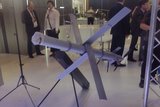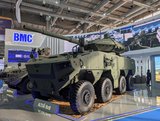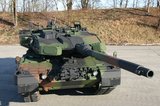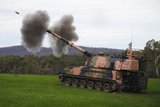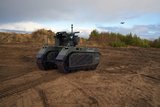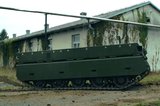Chinese arms deliveries to Africa put on hold
France, Britain and the US on 14 June 2018 put a hold on a request from the Central African Republic (CAR) for UN Security Council approval of Chinese weapons deliveries for its national forces.
CAR's defence minister asked a UN sanctions committee on 5 June to grant an exemption to an arms embargo and allow the shipments of Chinese-made armoured vehicles, machine guns, tear gas grenades and other weaponry for its army and police.
France said it had ‘concerns concerning some lethal equipment included in this exemption request,’ citing anti-aircraft weapons and ammunitions, according to a document obtained by AFP.
The French mission to the UN requested ‘additional justifications concerning this lethal equipment in order to be able to take a decision.’
The US noted that there was ‘no threat of an air attack in CAR’ and questioned deliveries of eight grenade launchers, four anti-aircraft machine guns as well as anti-personnel grenades and rockets.
Britain said it was concerned that the shipments would pass through Cameroon unescorted to the border with CAR.
In her request to the UN, CAR Defence Minister Marie Noelle Koyara said the weaponry would help strengthen national forces who are ‘confronted with the strength and escalating violence of armed groups whose illegal activities pose a threat to civil order.’
The council imposed an arms embargo on the CAR in 2013 when the country descended into bloodshed but its sanctions committee in 2017 gave the green light for Russia to supply weapons to the national forces.
China wants to donate military equipment which includes 12 armoured vehicles and four assault vehicles, 50 pistols, six sniper rifles, ten submachine guns with silencers and some 30 machine guns of various calibres.
The list of equipment from China's Poly Technologies also includes 300 rockets, 500 anti-tank grenades, some 725,000 rounds of ammunition of various types and 15,000 tear gas grenades.
The request for the Chinese weaponry is backed by a European Union military training mission and by the UN peacekeeping operation MINUSCA, which has come under repeated attacks from armed groups. Five peacekeepers have been killed in 2018.
In its note detailing objections, the US mission to the UN argued that special training was needed to operate the grenade launchers ‘which we are not certain has been provided.’
Most of the armoured vehicles and other weaponry would be used by special forces trained by Rwanda and certified by the EU training mission. Units of CAR's gendarmerie and police were trained by the UN police.
In her request, the defence minister argued that tear gas would help gendarmerie and police deal with crowd control as the ‘units do not currently possess any of this equipment designed to maintain order.’
The CAR exploded into violence following the 2013 overthrow of longtime leader Francois Bozize, prompting France to intervene with its Operation Sangaris.
MINUSCA took over an African Union-led mission in 2014, deploying some 12,000 troops and police, but the country remains overrun with militias, many of whom claim to protect Christian or Muslim communities.
CAR's leaders have repeatedly asked the Security Council to ease the arms embargo to allow shipments of equipment that will beef up the national forces.
More from Land Warfare
-
![World Defense Show 2026: Large vehicles and counter-drone systems take the limelight]()
World Defense Show 2026: Large vehicles and counter-drone systems take the limelight
Visitors who attended the first World Defense Show four years ago continue to speak of the difficulties they faced with poor facilities and power problems. This year’s event emphasised its status as one of the major defence expositions and as a place where regional players and those less welcome at other shows could take centre stage.
-
![MKJ Warrior Series — The Nett Warrior Qualified Connector for Today’s Soldier Systems]()
MKJ Warrior Series — The Nett Warrior Qualified Connector for Today’s Soldier Systems
ITT Cannon’s MKJ Warrior connectors are designed for the harshest environments, delivering mission critical comms, navigation and USB data/power.
-
![Active vehicle protection comes to the forefront as Trophy and Iron Fist secure contracts]()
Active vehicle protection comes to the forefront as Trophy and Iron Fist secure contracts
Experience on the battlefield is accelerating the adoption of active protection systems as technologies continue to evolve to reflect shifting global defence needs.
-
![World Defense Show 2026: Hanwha increases Middle East presence and reveals Tigon 6x6 sale]()
World Defense Show 2026: Hanwha increases Middle East presence and reveals Tigon 6x6 sale
Shephard sat down with Hanwha Middle East and Africa president Sung Il at World Defense Show 2026 to hear about the company’s plans for the region and how it plans to use local industry success to win deals.
-
![Estonia builds Asia-Pacific links as it looks to scale defence industry capabilities]()
Estonia builds Asia-Pacific links as it looks to scale defence industry capabilities
Collaboration between Estonian defence companies and well-aligned firms in Asia-Pacific will form a key part of Tallinn’s ambitions to significantly grow its defence industrial base.
-
![World Defense Show 2026: DOK-ING working on MV-8 variants and reveals specs ahead of Eurosatory]()
World Defense Show 2026: DOK-ING working on MV-8 variants and reveals specs ahead of Eurosatory
The Croatian company began the development of the MV-8 modular uncrewed platform in the early 2020s. Specifications for the vehicle were revealed to Shephard at World Defense Show 2026.









